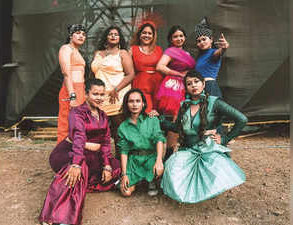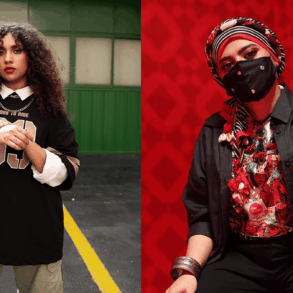” data-medium-file=”https://i0.wp.com/tsl.news/wp-content/uploads/2025/02/PJ-ceechynaa.png?fit=300%2C200&ssl=1″ data-large-file=”https://i0.wp.com/tsl.news/wp-content/uploads/2025/02/PJ-ceechynaa.png?fit=715%2C477&ssl=1″ class=”size-full wp-image-82322″ src=”https://i0.wp.com/tsl.news/wp-content/uploads/2025/02/PJ-ceechynaa.png?resize=715%2C477&ssl=1″ alt=”A drawing of rapper Ceechynna wearing an American flag bikini top and holding a shrimp.” width=”715″ height=”477″ srcset=”https://i0.wp.com/tsl.news/wp-content/uploads/2025/02/PJ-ceechynaa.png?w=2200&ssl=1 2200w, https://i0.wp.com/tsl.news/wp-content/uploads/2025/02/PJ-ceechynaa.png?resize=300%2C200&ssl=1 300w, https://i0.wp.com/tsl.news/wp-content/uploads/2025/02/PJ-ceechynaa.png?resize=1024%2C683&ssl=1 1024w, https://i0.wp.com/tsl.news/wp-content/uploads/2025/02/PJ-ceechynaa.png?resize=768%2C512&ssl=1 768w, https://i0.wp.com/tsl.news/wp-content/uploads/2025/02/PJ-ceechynaa.png?resize=1536%2C1024&ssl=1 1536w, https://i0.wp.com/tsl.news/wp-content/uploads/2025/02/PJ-ceechynaa.png?resize=2048%2C1366&ssl=1 2048w, https://i0.wp.com/tsl.news/wp-content/uploads/2025/02/PJ-ceechynaa.png?resize=272%2C182&ssl=1 272w, https://i0.wp.com/tsl.news/wp-content/uploads/2025/02/PJ-ceechynaa.png?w=1430&ssl=1 1430w, https://i0.wp.com/tsl.news/wp-content/uploads/2025/02/PJ-ceechynaa.png?w=2145&ssl=1 2145w” sizes=”(max-width: 715px) 100vw, 715px”>
21-year-old Lagos-born, U.K.-based drill rapper Ceechynaa’s latest single, “Peggy,” opens with an image that is as shocking as it is symbolic: “I’m peggin’ that man at the back of the bus.” The line is a brash declaration of power, placing men in the helpless, hypersexualized role usually inhabited by women. It’s audacious, explicit and intentional.
Hip-hop has always been a battleground for power and control, with MCs and producers innovating new styles, flows and ideas. Ceechynaa is flipping a long-standing norm of the male-dominated rap scene: objectifying women.
If it is the norm for rappers to degrade and objectify women, what happens when women turn that same energy against them?
Enter Ceechynaa, sporting micro denim shorts and skimpy bikini top, strutting the streets of London. Her appearance is the least provocative thing about her. The rising star’s lyrics unapologetically use misandry and emasculation as weapons to assert their autonomy.
Ceechynaa is not alone in this movement. Artists like Sexyy Red, Megan Thee Stallion and Cardi B have already pushed the boundaries of female rap and sexuality. Following in the footsteps of Lil’ Kim and Adina Howard, who faced similar backlash for their unapologetic sexual liberation in the ‘90s, these artists have certainly amplified the sexual liberation of women in hip-hop.
Ceechynaa takes it a step further. Female rap artists have reclaimed their own pleasure but have rarely used the genre to directly upend male dominance. Ceechynaa turns men into the spectacle in the same ways men have historically done with women.
“I’m in the back of the car with your daddy and he’s twerking and popping a perc,” she raps. Rather than simply asserting agency within the existing power structure, she flips the script entirely, making men the spectacle in a way that forces listeners to confront the genre’s long-standing double standard.
A 2009 study found that 67 percent of the examined rap lyrics sexually objectified women. Male rappers can be problematic while still retaining their credibility and personhood. Rappers like 21 Savage, Playboi Carti and Dr. Dre consistently diss others and objectify women in their lyrics, yet those traits don’t define their public perception and artistry.
Male rappers have built empires on explicit content, yet when women like Ceechynaa do the same, it’s suddenly deemed excessive, improper or a stain on the genre. Rap, a genre defined by nonconformity, has instead become conformist: it has normalized the objectification of women.
Detractors argue that misandry and emasculation are just as bad as misogyny. However, this argument ignores the power imbalance that has shaped the rap industry. Female rappers have historically lacked the institutional backing to challenge these dynamics on a large scale.
Rarely garnering mainstream attention, female rappers often conform to industry expectations — fueling rivalries and degrading one another through rap beef. Rivalries like Cardi B versus Nicki Minaj reflect how competition becomes a necessity to claim the few coveted spots available for women in hip-hop.
By taking a risk, Ceechynaa pushes for the same thematic and lyrical freedoms afforded to male artists. Female rappers shouldn’t have to choose between degrading other women or crafting a limited, singular image of themselves.
Ceechynaa’s approach is less an attack and more a necessary disruption of the status quo. As she puts it, “These men wanna act like a beast, so I put these men in a cage.”
Ceechynaa’s defiance goes well beyond her lyrics — she rejects industry expectations in every sense, from sound to appearance. “I want women to know that they don’t have to fit into what society tells them they need to fit into,” she said in an interview with British Vogue.
Simply put, Ceechynaa refuses to follow the rules — whether they involve lyrics, style or power — regardless if they’re dictated by men or quietly enforced by women.
The Black experience in America has always been controlled and confined by white America. Therefore, Black freedom will always entail breaking boundaries. Black artistry should not enforce conformity to an arbitrary moral standard that demands Black women remain quiet and non-threatening.
As she boldly states in Peggy, “Someone tell their pappy that Chyna said that she don’t give a shit.” Her deliberate rejection of established norms confronts not only rap’s misogyny but also the broader cultural forces that have long boxed Black women in.
Instead of dismissing Ceechynaa as another vulgar rapper, we should recognize her as a cultural disruptor who forces us to question the deeply ingrained norms in hip-hop and the wider entertainment industry. She is not setting us back — she is a reclamation of agency and an expansion of what Black artistry can be.
If we can celebrate the audacity of male rappers who have built careers on provocative and controversial content, then it’s high time we applaud women who dare to take up space, break the rules and rewrite the game on their own terms.
The rap scene has been cutthroat since its inception: Rap battles are the heart of the genre and many rappers loathe convention as much as they do other rappers. Now, we suddenly have a problem with women entering the ring dishing blows with the same aggression. Ceechynaa forces us to confront that what we crave from male artists is what we critique in female artists.
Art begins with change and ends with conformity; why should we expect women to conform and stand idly by while men are celebrated for being opinionated, sexual and aggressive?
We should find her lyrics jarring because they are. Ceechynaa is here to dish what we have been served for decades. If you can’t take it, don’t dish it.
This post was originally published on this site be sure to check out more of their content.




